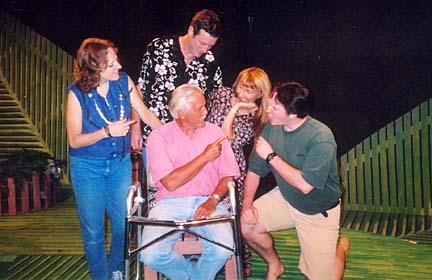


Somehow it seemed fitting that we should speak to John W. White about his new play "Poi Son" on a day filled with internecine bloodshed and turkey legs flung in anger. You know it as Thanksgiving. And it's safe to say that no matter how many fights you broke up this past Thursday, your own family's travails pale by comparison to those of White's fictional Oahu clan. Reality flirts with the absurd
in Kumu Kahua’s new playBy Scott Vogel
svogel@starbulletin.com"The mother lives in a Hawaii Kai assisted living center," said the writer while in rehearsals for "Poi Son," part of the Kumu Kahua Dark Night program, a new series of one-act plays that begins tonight. "The son is living in Hawaii and it's Thanksgiving, so the sister is flying over from the mainland."
This is no small sacrifice for the latter, a diehard fan of UCLA football who considers all game days sacrosanct. Her passion for the gridiron is so utterly complete, she will never forsake California for a permanent move to Hawaii, and even short visits require the payment of sartorial homage to her heroes. ("Throughout the play, her hair is half blue and half gold," explained White, "and her fingernails are painted likewise.")
As it happens, Sis isn't the only one with a bizarre set of preoccupations. Her brother, for instance, makes his living as a human bra.
A what?
"Rich women hire him to walk around cupping their breasts," said White, in whose fictional world Janet Jackson's famous magazine cover has spawned a fashion craze where women attend social events topless (thanks to this poi son and his helping hands).
On stage: 7:30 p.m. today, tomorrow and Tuesday 'Poi Son'
Place: Kumu Kahua Theater, 46 Merchant St.
Cost: $5
Call: 536-4441
Mom, meanwhile -- who incidentally doesn't mind her son's job as long as the money is good -- is mulling over a recipe for poison-laced poi, a cocktail by which she hopes to make a quick exit from old age and decrepitude. As such, the play itself seems a recipe for absurdity. Believe it or not, however, "Poi Son" has its roots in real-life events.
"I hesitate to say it, because they're exaggerated to the point of grotesquerie, but to some extent it's based on an experience with my own mother and sister," the playwright revealed.
"My mother is 90 now and a few years ago she had some back surgery and was in real pain. She had been a very healthy person up until that point, physically in great shape. This slowed her down terribly. And there was this recipe going around her nursing home community of applesauce with poison in it."
The original title of White's work, in fact, was "Applesauce"; until, that is, he got the idea to recast the action as a short story and enter the work in Honolulu magazine's annual fiction contest.
In hopes of bettering his chances in a contest with a local theme, the author removed the poison from the applesauce, sprinkling it instead on an island favorite. "Poi Son" was born. (By the way, the story was given an honorable mention by last year's judging panel.)
Even as his characters are no strangers to unlikely career shifts, White himself is a continually evolving creature. For five years he was the Star-Bulletin's theater critic (from 1985 to 1990), a post he eventually gave up in order to join Kumu Kahua's board of directors and devote more time to writing.
Since then, White has written "five or six" plays, including a comic sequel to "Death of a Salesman" in which the family collects on Willy Loman's life insurance policy and the eldest son strikes it rich as a leader of consciousness-raising seminars ("Biff Finds Himself in Hawaii" was produced by Kumu Kahua in 1990).
Though he hardly misses his old job ("I got tired of going to 50 plays a year"), White has praise for the local theater scene, which he says has improved greatly. As someone who has watched that scene for almost 20 years, I wondered if White had any advice for the Star-Bulletin's present critics.
He did. And the gist of such advice? The contentious relationship between theater companies and reviewers is not unlike a squabbling family at your typical Thanksgiving feast. Strong feelings abound, and the turkeys are plentiful.
"People will tell you that theater really needs your support because people don't go to plays, and it's all true. But on the other hand, it's not supporting theater to tell people to go to a bad play, because if they don't like it, they won't go back."
Click for online
calendars and events.